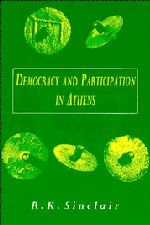Book contents
- Frontmatter
- Contents
- Preface
- Maps
- 1 The Athenian polis and the evolution of democracy
- 2 The privileges and the opportunities of the citizen
- 3 The responsibilities of the citizen
- 4 The sovereignty of the Demos, officials and the Council
- 5 Citizens and participation
- 6 The hazards of leadership
- 7 The rewards of leadership
- 8 The critics of Athenian democracy
- Appendix 1 The population of Athens
- Appendix 2 ‘Working days’
- Appendix 3 Notes on three constitutional matters
- Bibliography
- Index
1 - The Athenian polis and the evolution of democracy
Published online by Cambridge University Press: 01 June 2011
- Frontmatter
- Contents
- Preface
- Maps
- 1 The Athenian polis and the evolution of democracy
- 2 The privileges and the opportunities of the citizen
- 3 The responsibilities of the citizen
- 4 The sovereignty of the Demos, officials and the Council
- 5 Citizens and participation
- 6 The hazards of leadership
- 7 The rewards of leadership
- 8 The critics of Athenian democracy
- Appendix 1 The population of Athens
- Appendix 2 ‘Working days’
- Appendix 3 Notes on three constitutional matters
- Bibliography
- Index
Summary
Athenian views of developments to c. 500 b.c.
At some time about the 460s an Athenian boy was given the name Demokrates, which would seem to signify approval of the kratos (rule or power) of the dēmos (the people). This is the earliest known occurrence of the name. The choice might appear somewhat surprising, for the father Lysis belonged to a propertied family wealthy enough to engage in horse-breeding and chariotracing. Whatever the precise significance of Lysis' choice, the name at least suggests that the political role of the Demos in Athens was a matter of interest or perhaps of much debate at the time. To some the notion of the rule of the Demos was anathema. But the playwright Aeschylus probably reflected more accurately the attitudes of most Athenians in his play The Suppliants (produced c. 463). In anachronistic fashion not unknown in Attic tragedy he depicted – with evident approval – the need and the propriety for the king of ancient Argos to consult the people in assembly and win their support before giving refuge to the fugitive daughters of Danaos. Certainly by the mid-fifth century the power of the Demos was recognised in the public life of the Athenian state.
Athenians of the later fifth century and the fourth century had differing views about the beginnings of democracy. Some even traced the origins back to their legendary king Theseus, but for most, Solon, the lawgiver of the late 590s, was a key figure.
- Type
- Chapter
- Information
- Democracy and Participation in Athens , pp. 1 - 23Publisher: Cambridge University PressPrint publication year: 1988

